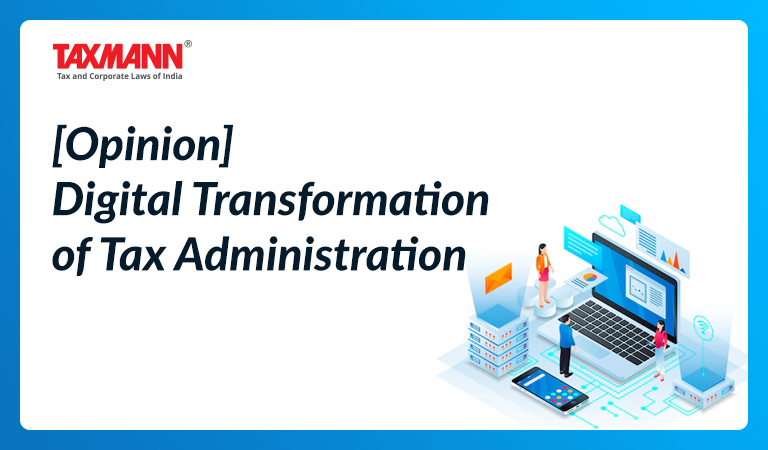[Opinion] Digital Transformation of Tax Administration
- Blog|News|Income Tax|
- 2 Min Read
- By Taxmann
- |
- Last Updated on 19 October, 2022

Pritin Kumar, Dilip Sutar & Dhrumin Sanghvi – [2022] 143 taxmann.com 189 (Article)
Tax administration has undergone a complete transformation in the past few years. With businesses going digital, it was only a matter of time before tax administrations adopted technology and transformed the way they function. The digitalisation of tax administration is a global phenomenon, and India is in the thick of things.
The present era has ushered in new age technologies such as artificial intelligence/machine learning, robotic process automation (RPA), cognitive computing, blockchain, etc. These technologies have transformed (in some cases disrupted) businesses in a big way and created new opportunities in terms of digital business models and doing things smartly. In the same way, tax administration has also been moving towards automation and digitalisation at a significant pace.
The OECD Forum on Tax Administration published a discussion document in December 2020 titled ‘Tax Administration 3.0: The Digital Transformation of Tax Administration’. The discussion paper set out a vision for the digital transformation of tax administrations, under which taxation becomes more of a seamless and frictionless process over time. The key attributes of Tax Administration 3.0 identified in the paper are:
- Data-driven
- Event-based, detailed and real-time data
- Enables validation and automation
- Enables assured data
- Interoperable ecosystems
- Enables international co-operation
An update on the seven actions undertaken pursuant to the discussion paper, was published earlier this year.
In terms of the building blocks identified in the discussion paper, it can be said that India is doing pretty well when it comes to areas such as digital identity, taxpayer touchpoints, data management and standards and new skill sets. The building blocks where the Indian tax administration can focus on are around integrating tax rules with taxpayer systems and governance frameworks.
Overall, when one considers adoption of technology within the context of tax in India, in relation to use of technology in tax compliance, processes and reporting, it can be said that the Indian tax administration has typically been ahead of taxpayers. For example, earlier, income-tax and indirect tax returns were filed in paper form, and reconciliations around TDS and input tax credit were carried out in Excel. Today, there has been a paradigm shift in the use of technology for filing returns and claiming credits. This digital tax transformation has been possible only because of the crucial role played by the Indian tax administration.
On the direct tax side, 2005 was a key year when the income-tax department introduced the utility for filing e-TDS returns; subsequently in 2006, income-tax return filing utilities for filing returns were introduced. While there were the normal teething issues initially on adoption of technology, but today the TDS and return filing utilities have been working seamlessly. There have been continuous enhancements in the return filing process over time, and one gets pre-populated returns from the income-tax department – a transformational situation no doubt.
Click Here To Read The Full Article
Disclaimer: The content/information published on the website is only for general information of the user and shall not be construed as legal advice. While the Taxmann has exercised reasonable efforts to ensure the veracity of information/content published, Taxmann shall be under no liability in any manner whatsoever for incorrect information, if any.

Taxmann Publications has a dedicated in-house Research & Editorial Team. This team consists of a team of Chartered Accountants, Company Secretaries, and Lawyers. This team works under the guidance and supervision of editor-in-chief Mr Rakesh Bhargava.
The Research and Editorial Team is responsible for developing reliable and accurate content for the readers. The team follows the six-sigma approach to achieve the benchmark of zero error in its publications and research platforms. The team ensures that the following publication guidelines are thoroughly followed while developing the content:
- The statutory material is obtained only from the authorized and reliable sources
- All the latest developments in the judicial and legislative fields are covered
- Prepare the analytical write-ups on current, controversial, and important issues to help the readers to understand the concept and its implications
- Every content published by Taxmann is complete, accurate and lucid
- All evidence-based statements are supported with proper reference to Section, Circular No., Notification No. or citations
- The golden rules of grammar, style and consistency are thoroughly followed
- Font and size that’s easy to read and remain consistent across all imprint and digital publications are applied



 CA | CS | CMA
CA | CS | CMA
